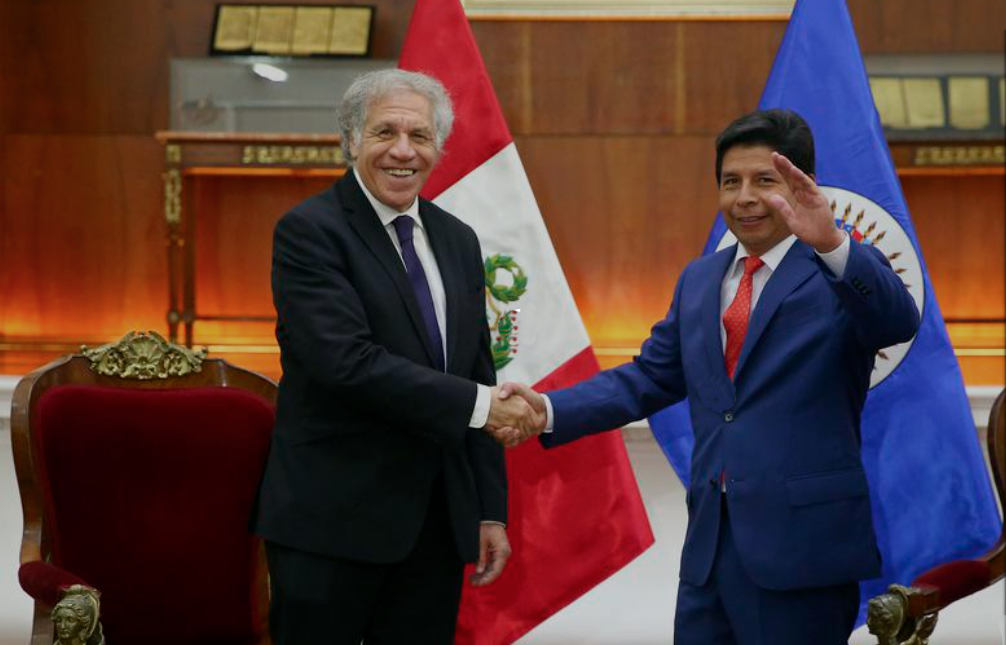After “29 meetings held with different governmental, public, private and civil society entities” in two days in Lima, the OAS mission, formed of eight foreign ministers or deputy foreign ministers of the region, has issued a report on the Peruvian situation which, especially due to its omissions, is complacent with Pedro Castillo’s government. Overall, it makes a few innocuous recommendations that leave the country in the same situation; that is, in the most critical situation of the last decades.
The so-called High-Level Group visited the country at the end of November, after the Peruvian government invoked the Inter-American Democratic Charter in October due to what it has been denouncing as a coup d’état in progress. The OAS Permanent Council accepted the request, expressed its solidarity with the government, and subsequently formed the mission which, after visiting the country, was to prepare a report to be presented to the Council itself.
The situation report highlights seven factors. Some are circumstantial (instability, high polarization, a confrontation between powers, excessive use of political control tools), others are, let us say, structural (the role of the media, the features of social crisis, racism, and discrimination), which the text interpolates in a way that tips the balance in favor of government positions. Example: Castillo is rejected by political actors because he is cholo (a Spanish-American Indian, an acculturated Quechuan of Peru and Bolivia), not because he is inept and corrupt, it must be inferred.
Corruption does not appear
The report highlights that “All the actors interviewed highlighted the high level of instability that exists” in the country. When examining the origin of this situation, it points to “the combination of several factors, among which the high fragmentation of the political forces; constant changes in the formation of cabinets; questioning of the appointment of officials for being considered unsuitable; hindering of the exercise of power; conflicting requests for mandate cuts and early elections; requests for the presidential vacancy (three presented to date), the use of the figure of the question of confidence; dissolution of the Congress of the Republic; open investigations against the President and other members of the Executive Branch, and the absence of dialogue among the main political actors.”
The entire paragraph deserves to be quoted, more than for what it points out – no doubt, existing factors -, because of what it keeps silent. At the core of this silence is the feature that, accumulating denunciations that have become a daily occurrence in the country, characterizes governmental management: corruption.
By omitting this element, which is added to the ineffectiveness of the state apparatus due to the lack of suitability of the main positions of the Executive Branch, it highlights the hindering of governmental action by the political opposition, which the text details: “the indiscriminate use of motions of vacancy, the denial to the President to travel abroad, constitutional complaints, motions of interpellation, votes of censure, impeachment”. Indeed, the work of the opposition, since Castillo was installed in government in July 2021, has been aimed at undermining his administration. But highlighting this factor in a discreet tone of reprobation and omitting a reference to the condemnable nature of the government’s actions causes an imbalance in the report.
The evaluation of the government’s actions is reflected in opinion polls. In the most recent one carried out by IPSOS, the most reputable pollster in the country, the lack of confidence in President Castillo reaches 68% of those polled. In comparison, 69% consider that Castillo governs for his own interests and those of his close ones, 67% think that he does not tell the truth and 65% believe that he is involved in acts of corruption.
The context, of a government without direction and repeatedly pointed out for acts of corruption, does not appear in the High-Level Group’s report, which at the time of writing this note was destined to be approved by the Permanent Council. This political body of an OAS discredited by the biases of its actions (especially since Luis Almagro oversees the General Secretariat), will indeed limit itself to grant the Peruvian government what it was looking for when it invoked the Inter-American Democratic Charter: support that will give it oxygen in the internal political struggle.
The report is left behind
That oxygen does not seem to have arrived. In the country, the reception of the High-Level Group’s report has been rejected by the informed opinion. On the one hand, its imbalance and the inclusion of structural problems – such as racism and discrimination – have been pointed out as a forced explanation of a crisis situation. On the other hand, the reception given by the text to the government’s criticism of the media – which, “concentrated in the hands of a few”, it accuses of lacking objectivity, of not being truthful “and in some cases even destabilizing”, while invoking “the exercise of freedom of expression with a constructive, responsible and impartial sense, and with respect for all actors”- has provoked an angry reaction in editorials and opinion columns.
In the end, the recommendations of the OAS report are of little importance, especially its call to channel the dialogue “to convene a formal dialogue between the presidency, legislature, high courts, representatives of political parties, and members of civil society, free of conditions”. To this effect, the text suggests “to initiate a political truce while the dialogue is established and convened”. The latter, according to some analysts, is an urgent need of the government, at a time when Castillo faces in Congress the possibility of being removed or suspended from office, in addition to the seven investigations opened by the Public Prosecutor’s Office.
With the ineffective management of the OAS mission, the country continues to deepen a crisis that, from being political, has spread to the economy due to the lack of investment growth and a possible decrease in mining production, besieged by social conflicts that do not find in the State an efficient instance of resolution. In the IPSOS survey, almost three-quarters of the respondents (73%) believe that the economy is worse than 12 months ago and 69% consider that government management is negatively affecting the economy and employment.
On the political scene, the political disintegration continues. Vice President Dina Boluarte has distanced herself from the President, waiting for Castillo to be relieved from office and for her to replace him. The Minister of Defense has resigned after only two months in office, amid rumors of a possible coup aimed at shutting down Congress. It is an increasingly rarefied picture, with some warning that it could lead to an outbreak of violence. It is a situation in which the OAS report will soon be forgotten, without much fanfare.
*Translated from Spanish by Janaína Ruviaro da Silva












